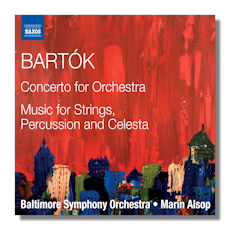
The Internet's Premier Classical Music Source
Related Links
- Bartók Reviews
- Latest Reviews
- More Reviews
-
By Composer
-
Collections
DVD & Blu-ray
Books
Concert Reviews
Articles/Interviews
Software
Audio
Search Amazon
Recommended Links
Site News
 CD Review
CD Review
Béla Bartók

- Concerto for Orchestra
- Music for Strings, Percussion & Celesta
Baltimore Symphony Orchestra/Marin Alsop
Naxos 8.572486 67m
Alsop's Bartók Concerto for Orchestra is epic in character, as it should be, but also somewhat restrained. Jagged edges are sanded, articulation tends more toward legato than staccato, and sharp attacks often come across a bit mellow. But Bartók, you'll remember, became a more mellow composer in his later years, and many serious musicians have insisted on a less percussive and less driven interpretive approach to even some early and middle-period compositions. Alsop makes a strong case for her way with this work, presenting the music in a fairly straightforward fashion, allowing the colorful Bartók instrumentation and varying moods to carry the listener along.
As most are aware each of the five movements of the 1943 Bartók Concerto spotlights a different section or sections of the orchestra and each features a different mood or character. The first movement is mysterious and folkish, while the second is humorous but with a solemn middle section. The third movement is very dark, but followed by a brief light intermezzo that also parodies the Shostakovich Seventh, an enormously popular symphony during the war which Bartók very much disliked. The finale is epic and triumphant. All of these qualities emerge strongly in Alsop's well played and well recorded effort here, but some listeners might prefer what many will call more authentic versions by Doráti (Hungaroton), Solti (Decca), and Iván Fischer (Hungaroton). But there are also excellent renditions by Leinsdorf (RCA), Salonen (Sony) and Previn (Telarc).
This is not to dismiss Alsop by any means – as suggested above she is very convincing in the Concerto, but her Music for Strings, Percussion and Celesta is even better. Bartók's "night music" moods come through most effectively: the first and third movements are especially grim and dark – eerie, really, while the more spirited music of the even-numbered panels is played with plenty of energy and color. This may well be one of the finest performances of the work on record, and while you can acquire excellent renditions by Bernstein (Sony) and Doráti (Hungaroton and Mercury), this new CD features superb sound reproduction and splendid playing.
Regarding the playing, in both works the Baltimore Symphony musicians turn in first-rate performances and present further evidence that there are not just a Big 5 among orchestras in the US (Boston, New York, Philadelphia, Cleveland and Chicago) but more like a Big 10 or 12, which would include, besides Baltimore, St. Louis, San Francisco, Pittsburgh, Los Angeles, and maybe Houston and Dallas. Am I forgetting Minnesota? I shouldn't. As for Alsop, she is ascending to the highest echelons of the conducting world, serving as conductor of the Baltimore Symphony Orchestra since 2007 and, from fall 2012, principal conductor of the São Paulo Symphony Orchestra. With the latter ensemble she is doing a cycle of the Prokofiev symphonies for Naxos, the first issue of which is due for release in summer, 2012. After hearing her Brahms symphonies with the London Philharmonic Orchestra on Naxos and this Bartók disc, I can only say I'm anxiously awaiting the Prokofiev cycle, as I think it should prove to be a highly rewarding series. Stay tuned.
Copyright © 2012, Robert Cummings





















